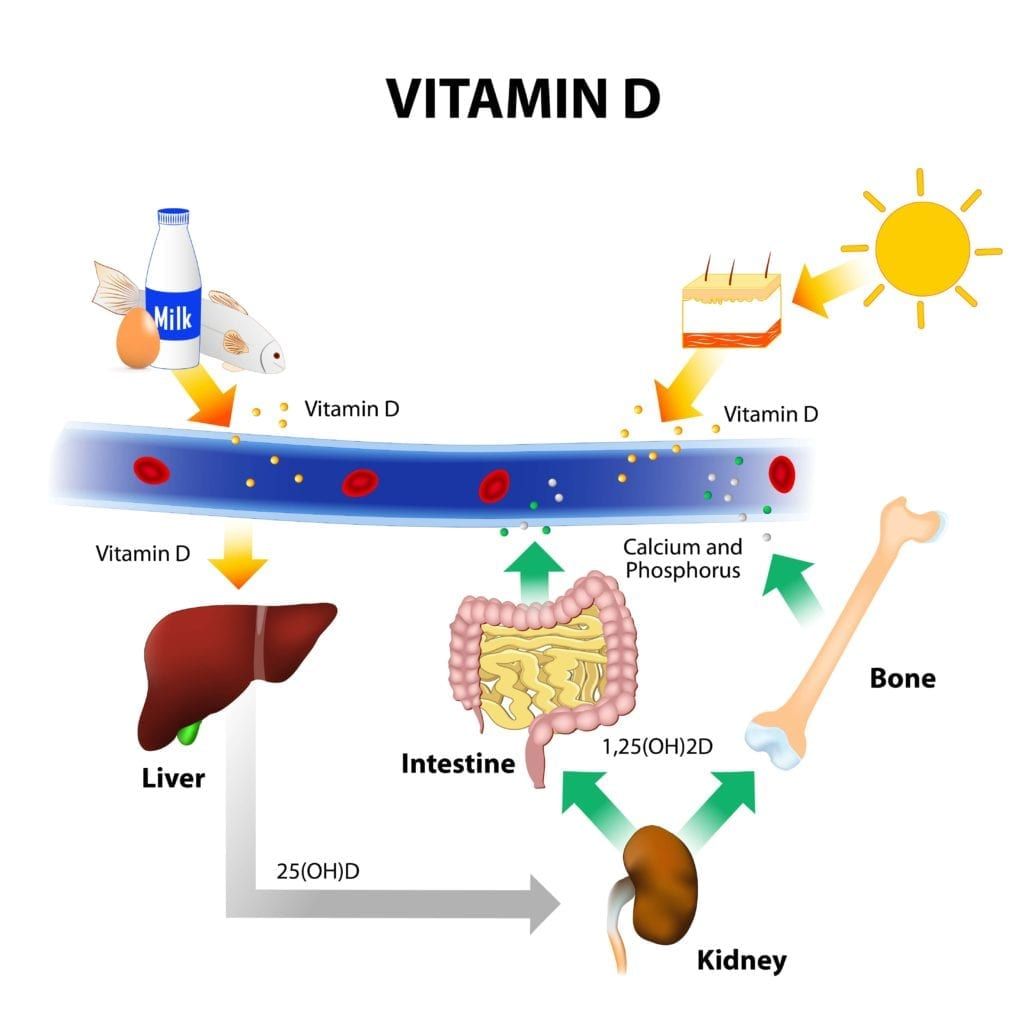
Did you know that as many as two thirds of otherwise healthy adults are vitamin D deficient? Vitamin D is responsible for helping your body to absorb calcium and calcium levels are directly related to your vitamin D levels. Vitamin D is obtained through the skin from the sun and through the small intestine from your diet and supplements. Since vitamin D is derived from the sun, people who do not go outside regularly can have a higher risk of developing a vitamin D deficiency.
To stay healthy, children and adults should be getting at least 600 IU of vitamin D a day, while adults over the age of 71 should be getting at least 800 IU. Unfortunately, vitamin D deficiency is an extremely common problem that many people may be affected by without even realizing it. There are certain risk factors for vitamin D deficiency including: being over the age of 65, having dark skin, being overweight, living away from the equator, constantly wearing sunscreen, and people who avoid eating fish or dairy products.
To determine if you are vitamin D deficient, your doctor can perform a simple blood test to check your vitamin D levels. While only a blood test can confirm a vitamin D deficiency diagnosis, you may be vitamin D deficient if you are experiencing any of the following:
Frequent Sickness
Vitamin D interacts with cells in your immune system and is partially responsible for keeping your immune system strong. Therefore, if you are regularly becoming sick with infections like colds or the flu, this can be an indication you aren’t getting enough vitamin D. In fact, getting sick frequently is one of the more common signs of a vitamin D deficiency.
Slow Healing
Along with getting sick more, wounds that heal slowly are another sign that you may be lacking vitamin D. This is especially true when it comes to recovering from dental procedures, since they can affect the bones. Vitamin D has been found to affect different aspects of healing such as the formation of new skin, controlling inflammation, and fighting against infection.
Bone Pain
Since vitamin D helps your body absorb calcium, it is directly related to your bone health. When you are not getting enough vitamin D, this can affect your calcium levels as well. This ultimately affects your bones and can cause bone pain. Lower back pain has also been linked to vitamin D deficiency.
Bone Loss
As mentioned above, vitamin D is essential for the body to absorb calcium. It is also responsible for bone metabolism, which is the process of keeping your bones healthy and strong. If the body is not getting enough vitamin D or calcium, then it will begin to leach calcium from the bones. This ultimately leads to bone loss and can increase the risk of fractures.

Fatigue
Feeling tired all the time can be another indication of vitamin D deficiency, especially in women. However, fatigue can also be caused by various other factors, so a blood test will usually be needed to determine if a low level of vitamin D is the culprit.
Depression
Along with fatigue, depression can also indicate a vitamin D deficiency. Oftentimes, these symptoms tend to go hand in hand and it may be hard to distinguish one from the other. Nevertheless, if you have noticed your mood has changed, you should visit your primary care physician to determine the cause.
Hair Loss
Some studies have shown a relationship between hair loss and low levels of vitamin D. However, hair loss can also be caused by other factors such as stress, disease, or nutrient deficiency. If you start taking vitamin D supplements and your hair grows back, most likely your hair loss was due to a vitamin D deficiency.

Dr Kumar is a highly skilled physician dedicated to providing gentle and effective care to patients of all ages and medical conditions. He achieved his degree in a field that he is passionate about. He believes that excellent health begins with education and has made his mission to enlighten patients to ways they can take greater control over their health. Dr Kumar is committed to continuing education activities and remaining aware of the latest advancements in Medical Science to maintain current high standards of care.
